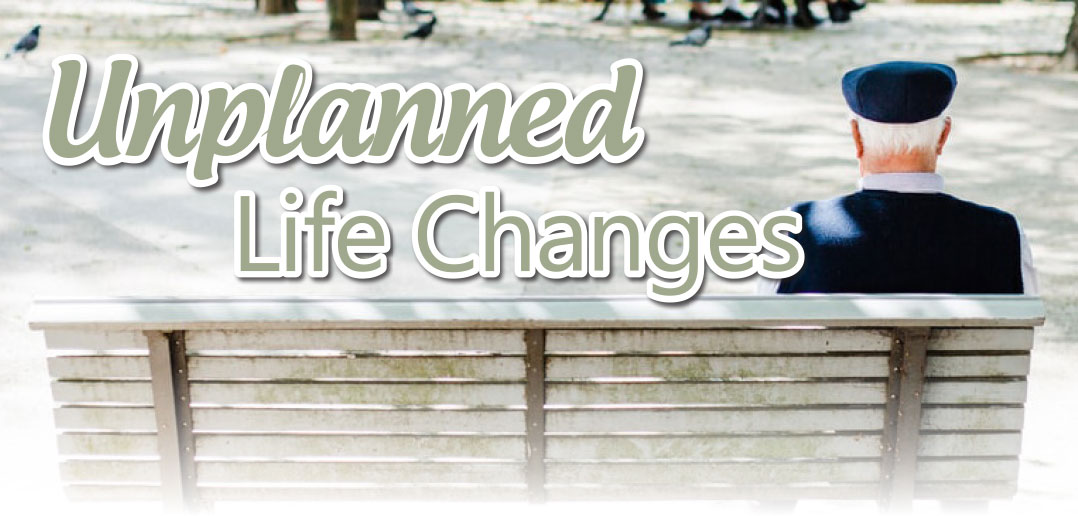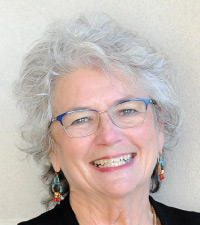Unplanned Life Changes
Change is never easy. Even when positive change occurs, it may still force us to say goodbye to a former time and way of life. Unwanted and unplanned changes can bring an even greater sense of loss as they pull us away from our comfortable routines and familiar circumstances. Change is often confusing and disorienting. It can move the ground beneath us. For seniors and their loved ones who find themselves unwittingly faced with an unexpected situation, life may become uncomfortable for a time. We recognize the severity of these life-altering events and hope to approach them with care. We believe there is great comfort in human experience and knowing we are not alone in life’s journey.
Recent events in the world have brought unexpected challenges to countless communities with the spread of COVID-19, widely referred to as coronavirus. The senior health and living industries in particular have been on the front lines of the crisis as they’ve cared for populations most vulnerable to this threat. We are extremely fortunate in our community to have the help of such knowledgeable and qualified professionals as well as access to the best and latest in health technology, excellent facilities, and medicine.
We spoke with individuals who spend their days looking to the well-being of seniors in our community for words of wisdom and encouragement to navigate the often turbulent waters that come with unplanned life changes. Across the board, these caring professionals expressed a sense of compassion, concern, and hope for seniors who face difficulties. Here are their thoughts of encouragement for handling unplanned life changes.
Take a Proactive Approach to Life
Many people may not think to look ahead for coming changes, such as limited mobility or a transition to a senior living community, until the need for change is imminent. This can cause anxiety and panic. On the other hand, anticipating change can help you steady yourself when life does change. Expecting the unexpected may not take away all the pain or difficulty from the situation, but it can ground you. Retirement, relocation, changes in health and physical capacity, and bereavement are common changes every senior should mentally anticipate.
Oasis Senior Advisors in Omaha is a good starting point for many seniors and their families as they build a plan for life transitions. The professionals at Oasis offer free senior housing placement services so you can find the right community to meet your needs. They rely on their cutting-edge OasisIQ™ software, as well as their extensive knowledge of the community, in order to reveal the best option available to each specific client.
Oasis helps families navigate the maze in the search for the best senior living environment for their individual situations so families can be proactive and prepared. Because seniors often have questions about the homes they are considering, Oasis provides information about the social services different communities offer, whether nursing care or special medical services are easily accessible, and other commonly-sought answers. At Oasis, families walk through these questions in a simple, step-by-step fashion, narrowing down the choices to those that are the best fit. Oasis can also help arrange tours for the places seniors are most interested in.
One senior living provider that offers a wide variety of highly-rated accommodations among their various communities is Hillcrest Health Services. Hillcrest Health Services has been providing senior care and senior living since 1967, and is now a leader among providers of aging-related services in eastern Nebraska. Their beautiful and thoughtfully-planned communities include Hillcrest Mable Rose, Hillcrest Country Estates, and Silver Ridge, among others. They also offer rehabilitation and extended-stay services at their Hillcrest Health & Rehab location in Bellevue and therapy services at Hillcrest Physical Therapy, the region’s only free-standing outpatient therapy clinic offering physical, occupational, speech and massage therapy in one location. Their integrated system of services offers a full continuum of care, including assisted living, memory support assisted living, outpatient therapy services, adult day services, skilled home health and personal care, inpatient rehabilitation, respite care, hospice, and compassionate end-of-life support. Their goal is to enhance the lives of seniors as well as their family members who love them.
Doing your research ahead of time and having a plan in place before emergencies arise is an important way to create peace of mind and lessen the stress and burden of difficult times. Taking a proactive approach can also help family members to be prepared for times of emergency so they are able to quickly respond when their help is needed. Even if you are unable to anticipate every difficult circumstance that may come your way, having some kind of plan in place can allow you to focus your energies on immediate needs that demand the most attention, knowing that other things will be okay.
List the Reasons You are Grateful
Research has proven time and time again that grateful people are happier, healthier, more able to cope with challenges, and less prone to mental health struggles such as anxiety, depression, and suicide. One study even found that people who practice gratitude experience decreased levels of physical pain.
Robbie Nathan, transition consultant with Bridge to Better Living, shared her thoughts on using gratitude to find the hidden gems in life, even during difficult times.
“We all need to remember there is so much to be grateful for,” she said. “It’s not what we don’t have; it’s what we still have. Age may decrease hearing, vision, or agility, but the memories seniors have, the life events they’ve experienced, affect how others’ lives evolve. Each person of age should feel valued and certainly know ‘this, too, shall pass.’ Do not hesitate to ask questions and do not stop until you have an answer. Be confident there are support groups and experts who will guide you through the complex navigation of aging. You are not the first and you will not be the last to hit a speed bump in life. Bridge to Better Living finds seniors to be inspirational and believes there are others who are in agreement. Let us help.”
With the current crisis of COVID-19 present in the community, Robbie assured us helpful people are still doing their good work for others.
“Coronavirus does not stop people from caring,” she said. “Bridge to Better Living has the latest technology and will continue to serve seniors and their loved ones. We are able to conduct consultations and tours virtually and are open for business. Placement with Passion® continues through this pandemic and beyond.”
Bridge to Better Living helps seniors navigate the complex world of senior living options by offering a no-cost-to client service to navigate the complexities of senior living options. They help find the most appropriate fit.
“A ‘Plan B’ is best formulated before unexpected changes occur, not when,” Robbie said. “Bridge to Better Living visits with families every day regarding the importance of knowing the choices available. Many people believe all retirement communities are the same. We show them how senior living communities may seem to offer the same amenities and services, but they are all offered in different ways.”
Bridge to Better Living’s services provide assurance and stability for seniors facing the transition of moving to a new community.
Enjoy the Beauty of the Here and Now
One potential obstacle in finding a sense of purpose in a new life is the realization that often these transitions separate us from certain beloved aspects of the past—things/people/places we once loved and enjoyed that are no longer a part of the new present reality. While this may hurt, the truth is that the present also holds beautiful people, places, things, and opportunities that were not available in the past.
Jennifer Knecht, vice president of marketing and sales for Immanuel Communities, understands this challenge as well as the transformation that comes into seniors’ lives when they discover the gift of the present.
“Most of us envision retirement as an easy, peaceful period in our lives,” she said. “In reality, it’s full of transitions like redefining our role in the lives of our now grown children, finding fulfillment without a nine-to-five, seeing friends come and go, or even experiencing the loss of a spouse. The transitions can be difficult, but what we’ve learned in working with thousands of seniors in all stages of aging is that you never know what amazing gifts are around the corner. New friends, passions, new outlooks on life are all there if we continue to be open to learning and welcoming them.”
Jennifer has witnessed the positive results residents experience when they embrace the beauty of their new circumstances.
“At Immanuel, we’ve heard amazing stories from residents who found incredible friendship late in life, and even love after loss,” she shared. “When we experience change, the tendency is to close off and retreat into our environment, but staying active is really important for physical and mental health. Get out there, join groups, be active, and connect socially to find those enriching experiences. The beauty of retirement living is that those experiences are already happening just steps from your door. The social aspect of senior living is a benefit that’s truly priceless, especially during difficult times. Immanuel is deeply committed to ending the senior loneliness epidemic through services and amenities that help seniors thrive.”
Don’t Try to Do it Alone
Whatever transitions seniors might face, it is important they don’t isolate and try to cope with everything all alone. The loneliness, lack of support and resources, and absence of outside insight caused by this isolation would inevitably compound whatever problems are already present. If seniors are timid about reaching out for help, they can take comfort in knowing there is an abundance of available resources for whatever they may be going through. Even if they don’t initially feel this comfort, they can plant the seeds for peace in the future by remembering that others have gone before them; life eventually returns to a normal state for most people, even if some adjustments are necessary. Having the companionship of friends and caregivers to offer this reminder can be a great source of comfort and stability.
In-home care is a great option for people with limited mobility who want some dependable human interaction and support but still wish to remain in their own homes. Julie Laughlin with Home Nursing with Heart explained that, because every individual’s needs are different, it is important to have services that can flexibly meet those needs. “For example, if someone in your family is experiencing medical issues and needs more than just help with common household tasks, skilled nursing is a very important resource,” she said. “Our nurses specialize in treating a variety of conditions affecting heart health, respiratory issues, and the mind. This kind of care isn’t just for individuals with ongoing conditions or diseases. It can be important for post-surgical recovery as well for short-term patients. For short-term care, a nurse would help with keeping surgical wounds clean and ensure they are healing properly and assist you in returning to regular life. They can also help identify if additional therapies may be needed.”
Julie discussed four basic types of recovery therapies, each focusing on a different problem people can experience:
- Physical therapy is the most general, focusing on mobility and strength recovery using traditional modalities and exercises. It can also help in regaining balance and making important movements such as traveling from your bed to the restroom more safe and efficient.
- Occupational therapy focuses on improving ability to perform key, daily tasks. For example, patients and care staff may form a plan to improve coordination to perform tasks such as dressing, eating, writing, or reading.
- Balance and fall prevention, like physical therapy, focuses on movement and strength. In addition, this strategy involves making a specific plan to remove common obstacles which can lead to falls and accidents. Whether it is someone’s vision or medication, or whether furniture in a home is laid out in a way that obstructs movement, there are many steps to ensure that navigating around the home does not become hazardous.
- Speech therapy is not only common to help patients of strokes and hearing loss to regain their ability to communicate, it also can help with memory problems and trouble swallowing.
Whatever kinds of therapies or services a home-bound senior may need, Home Nursing with Heart can offer the support and loving human touch needed to help through difficult life changes.
Take Advantage of Available Resources
One of the great advantages of living at this point in history is the availability of so many excellent, comprehensive resources. Kyle Johnson, owner of Care Consultants for the Aging, talked to us about their ElderCare Resource Handbook for families researching their options. The online edition of their Omaha handbook is available for free, and physical editions can be ordered for just a few dollars.
“Our mission is to provide the elderly and their adult children with assistance in achieving a continued independent living style,” Kyle noted. “We seek to find and refer caregivers and other professionals that provide support services. To help families walk through each aspect, Care Consultants has designed a free, simple, one-page task sheet to lay out key considerations. These include a handy list of services from medical care to food and nutrition, companionship, and mobility assistance to help families identify their priorities. As a free service, Care Consultants hopes to refer families to professionals who can meet their individual needs.”
With such great resources at your fingertips, it should be simple to get started in the initial phases of making a plan to move forward.
Visualize a Happy, Healthy Life
Making big life changes such as moving to a new community or learning to live with physical limitations will test anyone’s strength of character and ability to live a happy life. The good news is that, with practice, any person can create a vision for a happy, healthy life.
Whatever transitions may come your way, remember there are helpful, grounding practices that can make these transitions more smooth and painless. Most of all, remember to seek the assistance of caring professionals who help seniors live happy, healthy lives—even during times of change.





